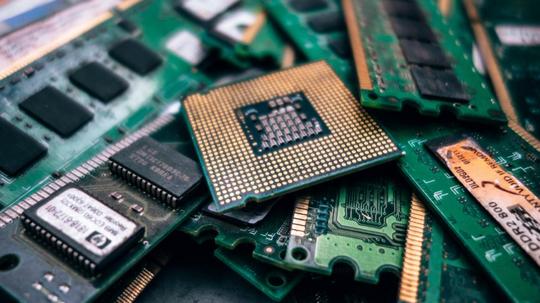
For nearly five years, Minnesota farmers, entrepreneurs, technologists and environmentalists have been working together to achieve the same goal: the right to repair their own electronics.
Under current laws, electronic manufacturers and farm-equipment dealers are not required to provide repair shops with replacement parts or instructions on how to repair devices. The most common arguments from these companies are that by withholding this information, they're protecting the quality of their products and the safety of their customers.
But owners of these devices argue that the measures put in place by these companies have created a repair monopoly that makes it difficult, costly and inconvenient to fix their smartphones, computers and farming equipment. Environmental advocates believe that consumers are more likely to discard their devices if they can't be repaired, contributing to a growing pollution problem caused by electronic waste.
Minnesota is one of 19 states that have proposed a piece of legislation called Fair Repair. The act, also referred to as Right to Repair in some states, would require electronics manufacturers to make their repair manuals, tools and parts available for purchase by consumers and repair shops. The bill covers devices such as cell phones, laptops, tablets, video game consoles and farming equipment.
The bill passed the House Judiciary, Finance and Civil Law Committee last month – its last stop on the way to a vote on the House floor. It's the most promising development that local Fair Repair supporters have witnessed in recent years.
Advocates for Fair Repair believe that the legislation could potentially fuel job growth in the repair industry and make a big impact on the environment by reducing the number of electronics that people replace or throw away.
Tech Dump is one of the Twin Cities organizations supporting the movement. The St. Paul-based social enterprise recycles unwanted electronics and also runs Tech Discounts, a store which sells refurbished electronics.
"What it comes down to is that we need to keep stuff working for the good of everyone."
As an e-waste recycler, Tech Dump accepts used, broken or unwanted electronics and attempts to refurbish them. But these repairs become difficult when the right parts aren't available. Because Tech Dump can't order pieces directly from manufacturers like Apple, they end up waiting for the exact right part to come in for the exact right device.
Tech Dump CEO Amanda LaGrange has been a fervent Fair Repair supporter since it was first proposed in Minnesota about five years ago.
"Right now, a lot of tech repairs are a Frankenstein sort of process," LaGrange told Minne Inno. "And it's not scalable. So in the long run, consumers end up tossing out devices that potentially could've been fixed."
She added that the current system limits the number of devices that Tech Dump and other third-party stores are able to repair because the right parts aren't available.
"We're storing an insane amount of components for one day when just maybe the exact right item comes through our doors," LaGrange said. "For the quantity that we aim to recycle and refurbish, this doesn't make sense."
Tim Schaefer, director of Environment Minnesota, joined the movement about a year ago and currently helps organize the Fair Repair coalition.
"Creating new electronics, especially smartphones, is always bad for the environment," Schaefer said. "If we keep phones out of the waste stream, there won't be a need to mine materials to build more. What it comes down to is that we need to keep stuff working for the good of everyone."
Schaefer estimates that Minnesota has approximately 65 tech repair shops.
"For a state of five million people, that's not that many," he said. "Many counties in the state may have one or none. These larger companies have gained an effective monopoly on repair, and it's bad for business."
"We have the resources and ability to make a dent in this problem. So why wouldn't we?"
Large tech companies have been fighting Right to Repair legislation across the country for years. Public documents from the State of New York show that Apple, Verizon, Toyota, Caterpillar, Medtronic and others spent money lobbying against the fair repair act in 2017.
The records showed that these organizations spent around $366,000 to retain lobbyists in the state in the first four months of that year. Meanwhile, the Digital Right to Repair Coalition, made up of independent repair shops with several employees, spent just $5,042 on the effort.
However, there are signs that Apple may be softening its tone on Right to Repair. It has more than 3,700 authorized repair shops across the globe.
Documents obtained by Motherboard show that Apple could implement Right to Repair legislation if it wanted to.
A presentation titled "Apple Genuine Parts Repair" dated April 2018 shows that the company has begun to give some repair companies access to Apple diagnostic software, a variety of genuine Apple repair parts, repair training and notably places no restrictions on the types of repairs that independent companies are allowed to do.
The presentation also counters many of the arguments made by lobbyists for the electronics industry, namely ones that believe the repairs are too difficult for any "unauthorized" people to attempt, or that the security of products could be affected by giving diagnostic tools to independent companies.
In Minnesota, Right to Repair advocates have faced similar pressure from large manufacturers, such as John Deere.
"It still feels like the underdog versus the behemoth," LaGrange said. "In almost every conversation, it's these small mom-and-pop shops up against experienced lobbyists."
But local Fair Repair supporters feel that they're gaining ground. Both LaGrange and Schaefer said that the bill has bipartisan support, and expressed optimism about the upcoming House vote.
"I've always thought of Minnesota as a place that's quietly bold about making big changes. It's a place where things like Right to Repair get taken seriously. This is something we could hang our hat on as a state," Schaefer said.
"I feel confident about where Right to Repair is headed," LaGrange said. "I think part of it is Minnesota's can-do attitude. This may seem like it's really specific to recycling, but it affects everyone. We have the resources and ability to make a dent in this problem. So why wouldn't we?"








